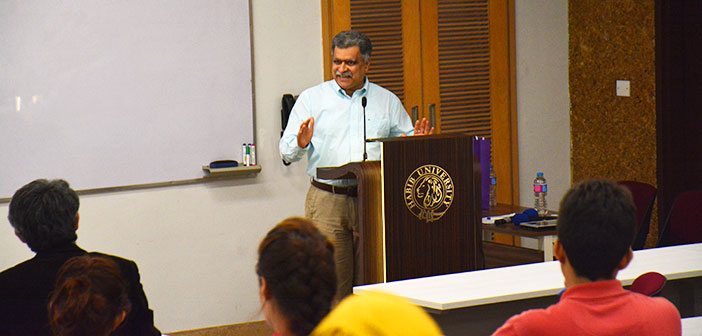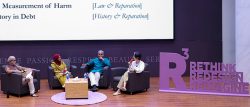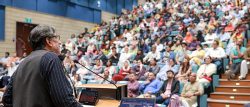The Yohsin Center for Social Development held its third Public Lecture at Habib University on April 21, 2016. The event was titled “The Politics of Development: An Anti-Politics Machine?”, with a lecture delivered by Dr. Haider Nizamani, Professor of Political Science at the University of British Columbia (UBC) in Vancouver, Canada. Moderated by Dr. Hafeez Jamali, the lecture was an education into the politics, or anti-politics, of development in villages in the rural parts of Pakistan.
Dr. Nizamani touched upon the subject of development policies from said sector and how they affect the villages on which they are applied upon. “Villages in Pakistan are sites where development policies are put into place, consequently affecting the reigning paradigms they involve, i.e, health, education, finance and governance. These aspects are brought into villages as ideas and practices through the local foot-soldiers of development”. He argued that while development projects have brought rural populations onto the global grid of being an anti-politics machine, the term development, in the context of today, is still where it was a few decades ago. Dr. Nizamani’s “conceptual lenses”, as he informed the audience, are derived from, and inspired by James Ferguson, whose book “The Antipolitics Machine” published 20 years ago, remains relevant on a global scale even now, concerning the role of the development sector.
He argued that the arrival of NGOs in villages in Pakistan means the arrival of a development project that is expected to employ some villages and expect the target population of these villages to receive goods and services, information, knowledge and strategies on progression.
Villages now associate some sort of goodies to arrive with NGO development projects, but they know that it is a temporary thing, and not something to rely upon for long-term relief.
Although NGOs are flourishing in parts of Sindh and Balochistan, there is no meaningful reduction in poverty in villages wherein the development projects take place. The decision that NGOs must make in Pakistan is, if there is a lack of impact through the development sector, should they jump on the bandwagon and be part of it as an anti-politics machine, or to bring politics back into the development discourse and practice.
Since the villagers who are affected by development projects, they are the objects of development, subjected to expert knowledge and management. But the management of these villages becomes the rationale in intervention in, say, health organizations. However, the development sector dabbles in marginal sectors, and don’t bother much in correcting the deteriorating systems of health, education, womens’ rights et cetera.
According to Dr. Nizamani, agents of development often unwittingly end up teaching the poor how to be docile and willing participants in a neoliberal economic order. Subjects of women, on the NGOs end, are expected to play the part of quiet consumers of the development projects. Poor villagers have little say in determining objectives or means of development projects, and they have to subscribe to preplanned objectives, regardless of whether they resonate with needs of the same villagers. “In short, the development sector is very safe in Pakistan, but the same cannot be said of the objects of their development projects, that is, the poor”.




